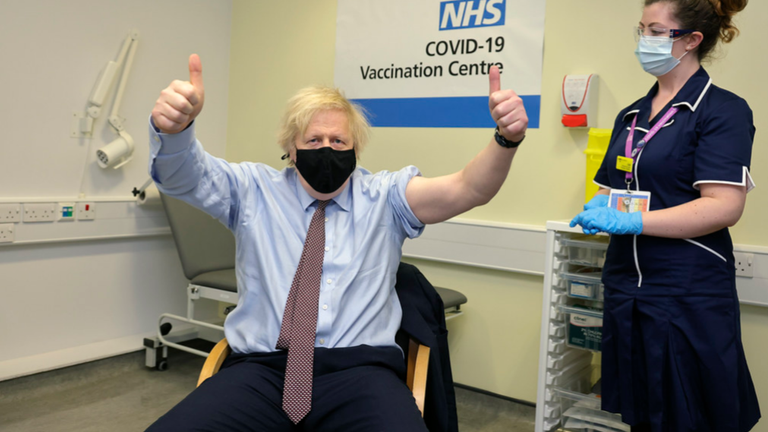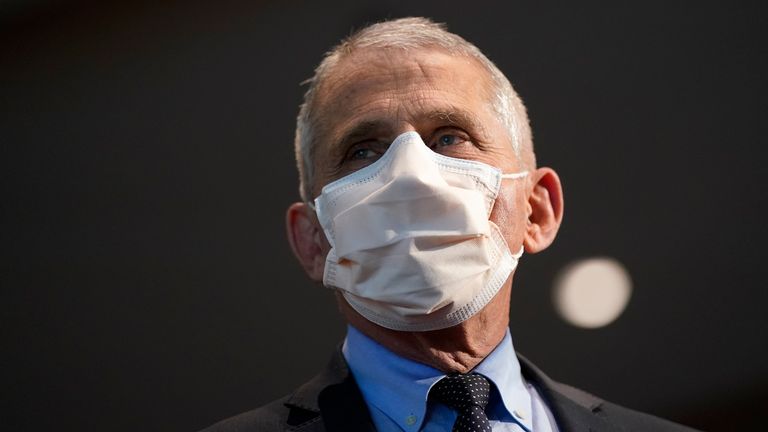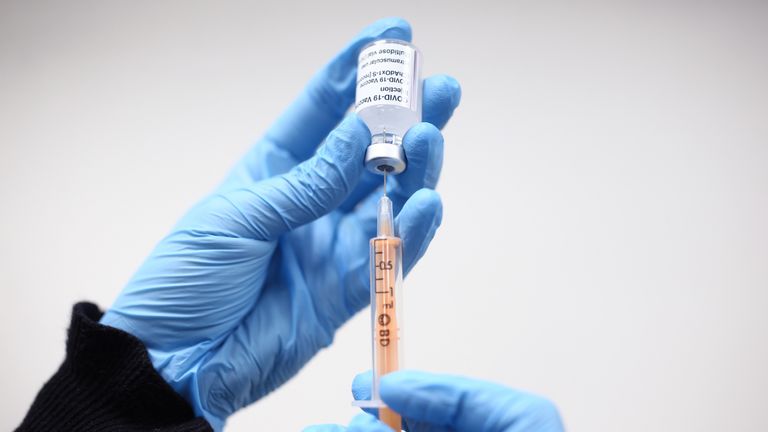COVID-19: AstraZeneca defends vaccine trial data against US claims of possible ‘outdated information’
AstraZeneca has defended its use of coronavirus vaccine data after US authorities suggested some results from a large American-led trial may have been based on “outdated information”.
The Anglo-Swedish company said the study showed the jab was 79% effective in preventing symptomatic COVID-19 illness and 100% effective against severe disease and hospitalisation.
The trial of 30,000 people showed no serious side effects, according to details released on Monday.
An independent safety monitor also found no increased risk of blood clots – something that caused European countries to temporarily stop using the vaccine until recently.
But a day after the release of the trial’s findings, concerns have been raised that AstraZeneca may have given an incomplete view of the data.
The US National Institute of Allergy and Infectious Diseases said the Data and Safety Monitoring Board (DSMB) had “expressed concern that AstraZeneca may have included outdated information… which may have provided an incomplete view of the efficacy data”.
“We urge the company to work with the DSMB to review the efficacy data and ensure the most accurate, up-to-date efficacy data be made public as quickly as possible,” a statement said.
AstraZeneca has said it will publish up-to-date results from the trial in 48 hours.
It said: “The numbers published yesterday were based on a pre-specified interim analysis with a data cut-off of February 17.”
The company added it had “reviewed the preliminary assessment of the primary analysis and the results were consistent with the interim analysis”.
“We are now completing the validation of the statistical analysis,” it continued.
“We will immediately engage with the independent data safety monitoring board (DSMB) to share our primary analysis with the most up to date efficacy data.”
America is still to approve the AstraZeneca jab, with the final decision to be made by the Food and Drug Administration (FDA) and Centres for Disease Control and Prevention (CDC).
The top US infectious diseases expert, Dr Anthony Fauci, said on Tuesday that the vaccine is still “very likely a very good vaccine”.
He told Good Morning America: “If you look at it, the data really are quite good but when they [AstraZeneca] put it into the press release it wasn’t completely accurate.”
Dr Fauci explained: “When the data from the AZ trial that was conducted predominately in the United States was analysed by the DSMB together with the company, what happened is that the company put out a press release giving data and making some conclusions about the efficacy.
“And the data safety monitoring board when they saw that press release, they got concerned and wrote a rather harsh note to them that was copied to me, saying that in fact they felt that the data that was in the press release were somewhat outdated and might in fact be misleading a bit and wanted them to straighten it out.”
Professor Stephen Evans, from London School of Hygiene and Tropical Medicine, said he was not “concerned particularly” about the DSMB statement “unless they had found a safety issue that was being hidden, which does not appear to be the case”.
Dr Peter English, a retired consultant in communicable disease control, criticised the US statement as leaving “room for speculation which could be damaging for vaccine uptake”.
More than a dozen European countries recently paused using the jab over fears it may have caused blood clots but a review by the EU regulator found it was safe and cleared it for continued use, with several EU nations resuming its rollout.
The World Health Organisation also insisted it was safe.
The vaccine, co-developed with Oxford University, has been a mainstay of the UK’s vaccine effort.
Analysis: AstraZeneca has suffered an extraordinary blow to the credibility of the jab
By Thomas Moore, science correspondent
AstraZeneca needed some good news to bolster its COVID vaccine after a turbulent week spent shaking off concerns over blood clots.
And it looked like it had it. The results from its key US clinical trials suggested the vaccine was safe and highly effective at preventing the disease.
But just a day later, it has suffered an extraordinary blow to the credibility of the jab.
Even Dr Anthony Fauci, the chief medical adviser to President Biden, went on Good Morning America to accuse AstraZeneca of making an “unforced error” that could contribute to vaccine hesitancy.
The PR nightmare was triggered by a very public dressing down from the independent panel of medical experts that oversaw the company’s clinical trials in America.
The panel had expressed concern that in its news release on Monday the company may have included “outdated information from that trial, which may have provided an incomplete view of the efficacy data”.
Scientists on this side of the Atlantic have been scratching their heads over what that could mean.
One suggested that the data may not have included the vaccine’s effect against increasingly common variants of the virus, which may make the results look a little better.
It may turn out there’s nothing to be concerned about. And even if the results change in the new analysis there is nothing to suggest the company deliberately excluded data to cast the vaccine in a more positive light.
But for months now there have been concerns expressed about some of the evidence for the vaccine. The stuttering over the correct dose to use, the gap to leave between doses, the small proportion of older volunteers in clinical trials, and so on.
Subscribe to the Daily podcast on Apple Podcasts, Google Podcasts, Spotify, Spreaker
The crying shame is that the AstraZeneca vaccine is without doubt highly effective. Just look at the steep drop in hospital admissions and deaths in the UK – real world data showing that the jab works.
That’s good enough for most people in the UK, where confidence in the vaccine has thankfully remained high and the rollout has continued at a blistering pace.
But on the continent, there are reports of a high number of people not turning up for the jab.
And that’s why this matters.
People need to trust the evidence to come forward for the jab.
And the “unforced errors”, as Dr Fauci calls them, just don’t help.
Source: Read Full Article





